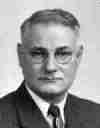
In Memoriam |
Within the span of my memory, eight Otterbein faculty and administrators have died "in the saddle", that is, before they could retire. In each case the person was someone who had given a number of years of service and was highly regarded. Each death was a blow to the community, leaving an emptiness that was not easily filled. I offer this story as my tribute to these persons and as an attempt to help keep their memories alive. They are (in order of death):
| Dr. J. Neely Boyer | Professor of Sociology and College Pastor |
| Dr. Paul Frank | Professor of Music |
| Mr. Peter Baker | Registrar |
| Dr. Richard Chamberlin | Professor of Music and A Capella Choir director |
| Dr. John Coulter | Professor of English |
| Mr. John Becker | Head Librarian |
| Dr. Jim Larson | Professor of Education |
| Mr. Richard Fishbaugh | Professor of Physical Education and Baseball Coach |

|
Mr. Boyer and his wife were killed in a airplane crash in the Pacific in 1953. From all sides he was considered to be an excellent teacher and the the community was deeply saddened by his death.

|
Dr. Frank was what one would call an "Old World Gentleman." As far as I could ever tell though, he simply never talked about his life before coming to Otterbein. Except at the piano he was quiet and seemed unassuming, but just beneath that was an intense and scholarly manner. The intensity would become apparent in his piano playing. After a few years he married Lillian Peyton of the art department; the couple became what I would describe as the cultural standard bearers for Otterbein. For most of the years up until his death Dr. and Mrs. Frank looked after Otterbein's Artist Series Program.
Dr. and Mrs. Frank remodeled an old church at the corner of Winter and Vine Streets into a most unusual, and effective home. Much of the sanctuary was left as a large open area, with Dr. Frank's grand piano as a focal point and Mrs. Frank's art collection surrounding. The Couple at first, and then Mrs. Frank, hosted many gatherings in this home until just a few years ago when her health would not permit. (Mrs. Frank passed away in December, 1999, and willed the house to Otterbein to be used as a museum.)
I have a special personal connection to Dr. Frank. My sophomore year I was scheduled to take second year German with Dr. Mills, but he suffered a detached retina, and in those days that took him out for an entire year. Dr. Frank was prevailed upon, as a native speaker, to teach the German class, which he did. I think about a dozen of us had an opportunity that no other Otterbein students had.
Dr. Frank was walking the few blocks from campus to home one day in 1965 when he simply collapsed and died. I think he probably would have wanted it that way.
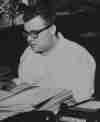
|
Peter "Pete" Baker worked in Otterbein's Registrar's office for a period of years that spanned my student, part time teaching, and early full time teaching. He had been a student studying for the ministry at Otterbein but contracted polio (before the days of the vaccine) and became confined to a wheel chair. Since he had worked in that office as a student, he simply continued to work there after graduation. He worked under the supervision of Floyd Vance until Floyd retired from the registrar's position, at which time Pete took over.
Pete was the organizational brains keeping Otterbein running in the days when there was no help from computers. He pretty well knew from memory each class, when it met, where it met, what its prerequisites were, and who was teaching it this time. He knew how to put together a class schedule which reduced student conflicts to the minimum.
At the end of the semester, when it became time to give grades, Pete really went into action. He collected the grade cards from faculty, sorted them by student, calculated new grade point averages, and then typed grade reports. I observed him doing that on several occasions, and simply could not believe the speed and accuracy with which he could type. He produced grade reports, at his typewriter, for about a thousand students in the space of a few days.
Unfortunately, the polio, the confinement to a wheelchair, and a sedentary occupation took its toll. Pete died of a heart attack in 1978. Dan Thompson, a just graduated employee in the office, deserves great credit for being able to step in and in relatively short time fill the very large vacancy left by Pete.
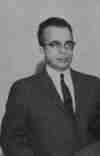
|

|
Dr. John Coulter, or "Jack", was a teacher of English at Otterbein during my days as a student, as a part-time teacher, and as a full-time teacher. During my Senior year I and a number of other science majors (including my fiancé, Sara Elberfeld) all decided, rather independently, to take a course in Western World Literature (normally only taken by English majors) as an elective. This course was taught by Dr. Coulter and I think all of us chose it, not for the particular content, but for the teacher. In later conversations with Dr. Coulter he said that that was one of the best classes he ever had.
I'm sure there are many stories about Dr. Coulter. One aspect of his teaching was that because of his height he could never find a comfortable position at the front of the room. He did much of his teaching sitting on the desk. Sara worked in the college library during summers and has told me that one of the regular duties involved in closing the library at the end of the day was to look through the stacks to see if Dr. Coulter was still there and to ask him to leave if he was. I believe he got shut in more than once.
At a faculty retreat one fall we were taking turns presenting a brief lesson from our disciplines and then discussing our methods with the group. I remember that after my presentation of a bit of mathematics Dr. Coulter remarked that it seemed that mathematics was a lot like poetry. Looking back, I wonder how I could not have known that all along, but in fact, he opened my eyes to the relationship.
The thing I remember most about Dr. coulter, though, is that he seemed to be a voice for the conscience of the college. One of his most common remarks was "That's outrageous!" when someone would make a suggestion that embodied the idea that an institution with noble goals was entitled to use ignoble methods. In my opinion, no one since has filled that role so well. He is definitely missed.
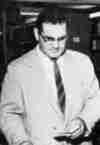
|
John was the opposite of the stereotypical librarian; he was relaxed, friendly, and wanted books to be used. He was also a dogged collector of material of future historical significance for the archives. I remember that there was one year when the Sibyl (yearbook) editors decided to produce a yearbook with only pictures, no words. When John Becker saw it he was furious; in that state it was worthless as an historical record. John hired a group of students whom he thought would be most likely, collectively, to identify the pictures, and they worked all through the summer producing an annotated copy of the yearbook.
John liked to walk and to ride a bicycle. He often rode his bicycle to and from work; and he often went for a walk in the evening. One evening he came home from his walk, remarked on how tired he felt, sat down in his chair, and within a short time was dead of a heart attack. It was almost more than the community could comprehend.
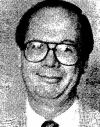
|
Jim was a also regular at lunch in the Faculty Lunchroom (later named the 1847 room). He always seemed to have a joke or an insight to share. I particularly remember him explaining to us (he said he was serious) that the correct term for a teacher to use in describing the fact that a student had "given the finger" was "digitus impudus." (I was never able to confirm that.) Jim died suddenly and unexpectedly of heart failure during a routine operation in the spring. He is very much missed.
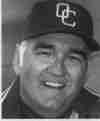
|
Dick "Fish" Fishbaugh was perhaps one of the kindest and easy to like persons I have known. Although I didn't know him well, I think I was like just about everyone who ever met him; I considered him a friend and he made me feel that he regarded me the same way. I know that he was a friend and mentor to a large number of students, both on and off the ball diamond.
Fish compiled an admirable record during his many years of coaching at Otterbein. It seemed to me that more years than not the only question in OAC baseball was whether it would be Otterbein or Marietta at the top of the ranking at the end of the season. A visit to the campus of Marietta convinced me that there had been a conscious decision there to emphasize baseball above all other sports. No such emphasis exists at Otterbein, and yet several times Otterbein baseball teams went some distance into the national Division III tournament.
Dick even succeeded in recruiting Paul O'Neill from Brookhaven High School. Unfortunately (for us), before Paul had a chance to play for Otterbein the Cincinnati Reds made him an offer with which Otterbein couldn't compete. If Paul sees this I would ask him to consider that when his baseball career is over (and I hope that is not soon even if he is playing for the Yankees now) the opportunity for an education at Otterbein will still be available. I know Coach Fishbaugh would say that (and maybe did) if he had the chance.
It is my understanding that Dick had thought about retiring at the end of the 1998-99 school year. However, the won-loss record at the end of that season was not to his satisfaction and he determined to give it one more year because he was sure he could end on a better note. Even now, though, most people won't remember what that last won-lost record was; what they will remember is the first place kind of person that Richard Fishbaugh was.